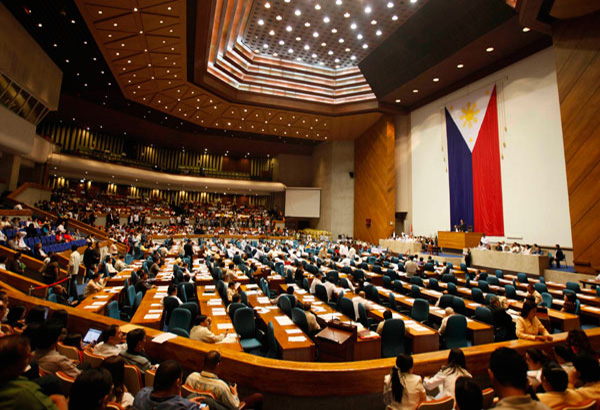Traders caution government on federalism
July 13, 2016 at 17:00
Traders caution government on federalism

At the House of Representatives, prospective Speaker Pantaleon Alvarez expressed openness to the revival of the Bangsamoro bill if Filipinos reject federalism. File photo
Filipino businessmen and foreign chamber executives told The STAR federalism is poised to gain more if the move is done right as a change in the form of government that President Duterte is advocating would have major implications for the country’s investment climate. Philippine Exporters Confederation Inc. president Sergio Ortiz-Luis Jr. said the change is either a good one or a bad one. “It is bad if it is hurried up and not studied carefully,” he said.
“Investors probably will be confused dealing with many rules once the country gets separated into several states. They may turn away from investing.” American Chamber of Commerce of the Philippines senior advisor John Forbes cited the US as an example of the complexity of a federal system of government.
“The US has one set of national laws and 50 sets of state laws,” he said. “Inevitable, a federal system is more complex for investors because of increased legal complexity.” However, Forbes said the US manages to remain the biggest recipient of foreign direct investment in the world because of a huge economy that has the least restrictions. “So a federal system in the Philippines should not per se be an obstacle,” he said. Philippine Chamber of Commerce and Industry president George Barcelon said a well-studied shift to federal system should be able to bring about political stability and clear rule of engagements to drive investor appetite. “As such, business confidence will definitely improve to attract more investments from both local and foreign,” he said. “We have no objections to federalism of government but must be structured with objectivity and prudence, hoping this will bring equitable sharing of revenues and with clear responsibility and accountability of the states formed. It’s not an easy task as we already have Local Autonomy Law and (Bangsamoro Basic Law or BBL) proposal. But ultimately, we hope that this will propel well-balanced nation growth, in particular for the MSMEs to create more job and bolster inclusive growth.” MSMEs refer to micro, small and medium-scale enterprises. European Chamber of Commerce of the Philippines vice president Henry Schumacher said a move to federalism is a major change, with a number of intermediate steps and the creation of a policy framework to achieve what Duterte has in mind.
“Businesses will have to assess the effect of federalism carefully,” he said.
“It would be good to study best practices in federalism in Europe and the US first to understand what works and what not. As said, businesses will have to adjust substantially and will have to study impacts before final decisions are made.”
At the House of Representatives, prospective Speaker Pantaleon Alvarez expressed openness to the revival of the Bangsamoro bill if Filipinos reject federalism.
“That’s okay with us,” he said in reaction to pronouncements of Duterte last week about his Plan B should federalism lose in a plebiscite.
Alvarez said the statement of Duterte shows that he respects due process and respects the rule of law as part of his “transparent governance.”
“The President, being a lawyer, has high regard to the constitutional structure of power,” he said.
“He respects the constitutional and legal process. All of us must abide by the process in accordance with the Constitution and laws.”
Alvarez is the principal author of House Concurrent Resolution 1 seeking to revise the Constitution through a constitutional convention to be comprised of regionally elected and appointed delegates.
In separate interviews, Representatives Feliciano Belmonte Jr. of Quezon City and Makmod Mending of Anak Mindanao welcomed Duterte’s statement.
Belmonte said it would be good if federalism would be acceptable to the Moro Islamic Liberation Front and the Moro National Liberation Front.
“And I’m happy his fallback is BBL where we spent so much time and effort,” he said.
Mending said making the BBL an alternative “is the most realistic and practical approach in addressing the Bangsamoro problem.”
“The President is aware of the nuances and the realities on the ground,” he said. While the Office of the Presidential Adviser on the Peace Process seeks an all encompassing solution to implement all previously signed agreements between the Moro fronts and the Philippine government, the legislature is going to give federalism a shot.
“But if a shift to federalism will not prosper, then the BBL will be there to save the day for our people. In the end, the Bangsamoro people can only bank on the political will of the President.”
In the last Congress, House Bill 5811, which is in substitution for HB 4994 or “An Act Providing Basic Law for Bangsamoro Autonomous Region,” reached the stage of period of amendments.
The bill seeks to abolish the Autonomous Region in Muslim Mindanao and create a new autonomous Bangsamoro region.
It was an offshoot of the government’s Comprehensive Agreement on the Bangsamoro with the MILF and a product of negotiations between the Aquino administration and the Moro rebel group to forge a peace agreement.
Source: www.philstar.com

















